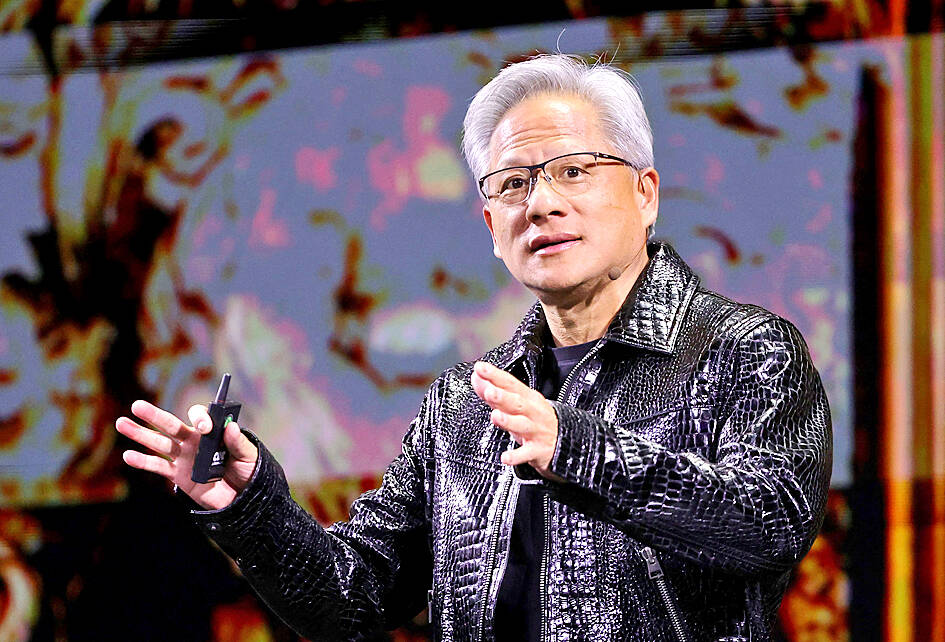Nvidia Corp cofounder and chief executive officer Jensen Huang (黃仁勳) on Tuesday said he is ready to meet US president-elect Donald Trump and offer his help to the incoming administration.
“I’d be delighted to go see him and congratulate him, and do whatever we can to make this administration succeed,” Huang said in an interview with Bloomberg Television, adding that he has not been invited to visit Trump’s home base at Mar-a-Lago in Florida yet.
As head of the world’s most valuable chipmaker, Huang has an opportunity to help steer the administration’s artificial intelligence (AI) policy at a moment of rapid change. Nvidia is looking to speed the deployment of advanced AI systems around the world — much of which depend on its industry-leading chips.

Photo: Reuters
Trump has said that he would impose trade tariffs that might affect companies like Nvidia, which rely heavily on overseas sales and outsourced manufacturing. Nvidia already faces restrictions that prohibit some of its most capable — and lucrative — chips from being exported to China, the biggest market for semiconductors.
“We will give them as much insight as we can from our perspective,” Huang said. “I am sure the administration will make the right moves.”
The remarks follow a wide-ranging product unveiling on Monday that included new chips, software and services.
Nvidia is looking to maintain its edge in AI computing after explosive growth over the past two years.
The Santa Clara, California-based company has said that AI would fuel a new industrial revolution, and Huang envisions a world with 1 billion humanoid robots, 10 million automated factories and 1.5 billion self-driving vehicles.
During a separate question-and-answer session at the CES in Las Vegas, Huang said he expected Trump to bring less regulation.
“I think that’s a good thing,” he said. “As an industry, we want to move fast.”
Meanwhile, Huang stopped short on Tuesday of confirming that his company was going to set up an overseas headquarters in Taiwan, but did say the company needed to expand its office space there.
“We have a lot of employees in Taiwan today, and the building is too small, so I have to do something about that...We’re looking for real estate,” he said at the CES conference when asked about the headquarters idea.
Huang added that he could “announce something” at the Computex trade show, which is slated for May 20 to 23 at the Taipei Nangang Exhibition Center.
Huang had previously teased the idea of building a headquarters in Taiwan in June last year during last year’s Computex, without providing any further details.
In addition to visiting Taiwan during Computex, Huang said his next trip to Taiwan would be to attend the Lunar New Year party of the Nvidia Taiwan office, which is scheduled for Friday next week.
It is an annual tradition for him that he looks forward to, he said.
Additional reporting by CNA

IN THE AIR: While most companies said they were committed to North American operations, some added that production and costs would depend on the outcome of a US trade probe Leading local contract electronics makers Wistron Corp (緯創), Quanta Computer Inc (廣達), Inventec Corp (英業達) and Compal Electronics Inc (仁寶) are to maintain their North American expansion plans, despite Washington’s 20 percent tariff on Taiwanese goods. Wistron said it has long maintained a presence in the US, while distributing production across Taiwan, North America, Southeast Asia and Europe. The company is in talks with customers to align capacity with their site preferences, a company official told the Taipei Times by telephone on Friday. The company is still in talks with clients over who would bear the tariff costs, with the outcome pending further

A proposed 100 percent tariff on chip imports announced by US President Donald Trump could shift more of Taiwan’s semiconductor production overseas, a Taiwan Institute of Economic Research (TIER) researcher said yesterday. Trump’s tariff policy will accelerate the global semiconductor industry’s pace to establish roots in the US, leading to higher supply chain costs and ultimately raising prices of consumer electronics and creating uncertainty for future market demand, Arisa Liu (劉佩真) at the institute’s Taiwan Industry Economics Database said in a telephone interview. Trump’s move signals his intention to "restore the glory of the US semiconductor industry," Liu noted, saying that

NEGOTIATIONS: Semiconductors play an outsized role in Taiwan’s industrial and economic development and are a major driver of the Taiwan-US trade imbalance With US President Donald Trump threatening to impose tariffs on semiconductors, Taiwan is expected to face a significant challenge, as information and communications technology (ICT) products account for more than 70 percent of its exports to the US, Chung-Hua Institution for Economic Research (CIER, 中華經濟研究院) president Lien Hsien-ming (連賢明) said on Friday. Compared with other countries, semiconductors play a disproportionately large role in Taiwan’s industrial and economic development, Lien said. As the sixth-largest contributor to the US trade deficit, Taiwan recorded a US$73.9 billion trade surplus with the US last year — up from US$47.8 billion in 2023 — driven by strong

STILL UNCLEAR: Several aspects of the policy still need to be clarified, such as whether the exemptions would expand to related products, PwC Taiwan warned The TAIEX surged yesterday, led by gains in Taiwan Semiconductor Manufacturing Co (TSMC, 台積電), after US President Donald Trump announced a sweeping 100 percent tariff on imported semiconductors — while exempting companies operating or building plants in the US, which includes TSMC. The benchmark index jumped 556.41 points, or 2.37 percent, to close at 24,003.77, breaching the 24,000-point level and hitting its highest close this year, Taiwan Stock Exchange (TWSE) data showed. TSMC rose NT$55, or 4.89 percent, to close at a record NT$1,180, as the company is already investing heavily in a multibillion-dollar plant in Arizona that led investors to assume